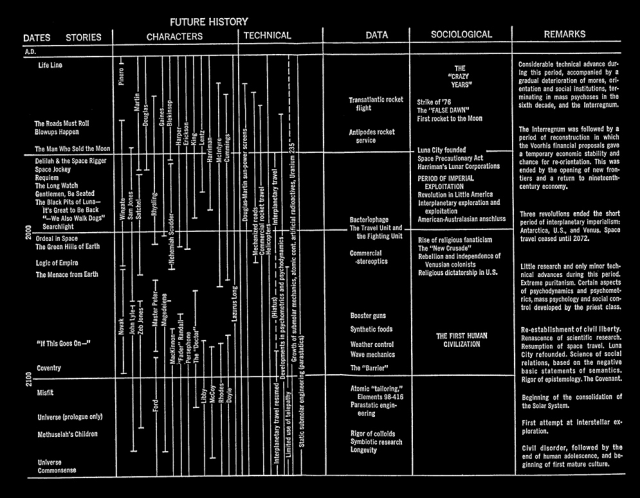Robert Heinlein plotted out the entire arc of his “Future History” stories on a chart that included technological, social, and political events that either featured in or were key drivers for individual stories:
While our actual technological advances haven’t matched Heinlein’s predictions, you could make a strong case that the sociological column got it right by calling the era from the late-sixties onwards “The Crazy Years”. Samizdata‘s Johnathan Pearce linked to this post by Charles Steele which makes the case quite well:
In his Past Through Tomorrow and other works, Robert A. Heinlein explored a possible future history for homo sapiens. One of things he foresaw was a period at the end of the 20th Century and beginning of the 21st that he called “the Crazy Years,” in which cultural fragmentation and decay in advanced countries generates political and economic decline and social disruption. He was prescient in recognizing what happens when commonly accepted principles such as an individual’s responsibility for self are forgotten and political correctness and multiculturalism run amok. As advancing technology places increasing power in human hands, human ethics fail to keep pace. In Heinlein’s world, humans do manage to navigate these shoals without destroying themselves and eventually do settle on a MYOB sort of libertarian ethic…but only narrowly averting nuclear self-destruction and environmental self-destruction, and not without going through periods of dictatorship as well as societal chaos.
Heinlein’s story isn’t just fiction. In the course of the development of the Soviet SETI program, astrophysicist Nikolai Kardeshev developed a theory of civilizations and what we might look for in trying to detect them. Kardeshev’s work — which has been further developed by others — gives a classification system based on the scale at which a planet-based civilization can harness energy. The lowest level of civilization, Type I, has the capability of harnessing the entirety of the energy of its planet. As a sort of corollary, it’s hypothesized that a species that is approaching Type I mastery potentially goes through a very dangerous period, akin to Heinlein’s “Crazy Years.” Their advanced level of technology gives them power capable of destroying the civilization if misused. If the species fails to develop behaviors, ethics, institutions, etc. that prevent this it can annihilate itself. I’m uncertain how much of this corollary is in Kardeshev’s original contribution, but physicist Michio Kaku suggests that one thing we could look for in SETI is the wreckage of civilizations that failed to make the transition to Type I. And of course, our civilization is our one example, so far, of a civilization entering this transition.
What’s the connection between Heinlein and Kardeshev? Think of just a few examples of the dangers we face today:
- Iranian or Al Qaeda religious fanatics obtaining nuclear weapons…
- An American federal government — especially the executive branch — working to acquire unlimited power, and already apparently having the power to spy on essentially all communications, everywhere…
- A growing segment of the population — some poor and some very rich (think Goldman Sachs) — who live as parasites on the productivity of others while creating nothing of values themselves…
- An intelligentsia that cannot bring itself to condemn Islamism for fear of being seen as insensitive or racist or ethnocentric, but which regularly denounces, in the most hateful terms, anyone who opposes the continued expansion of state power…
- An intelligentsia that praises socialism, hunter-gatherer economies, massive interventionism, anything but the one system that actually works, free market capitalism, a system they bitterly condemn…
- A “press,” our mainstream media, that sees its job as promoting political positions and readily lies when lies serve this goal better than truth, and spouts nonsense the remainder of the time, apparently because reasoned analysis is too hard.
Yes, we’re in the crazy years, for sure.
And yet, in spite of all this, he’s still optimistic about the future.




